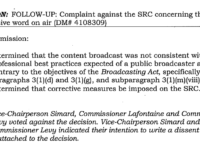The first two posts of this series on Bill C-11 focused on the risks to user content and Canadian creators. This post picks up on the implications of the bill for consumer costs and choice. In short, at a time when political parties are focused on affordability and inflation, the Bill C-11 effect is likely to increase consumer costs and decrease choice. There is no magic solution that results in hundreds of millions of new money entering the system without someone paying for it. It is fairly clear that that someone will be Canadian consumers as streaming services either hike Canadian fees to account for their new costs or shun the market altogether. It should be noted that it doesn’t need to be that way: a bill that establishes thresholds to exclude smaller services would limit the negative effects on competition and a sufficiently flexible approach to Canadian contributions would recognize that the large streaming services already invest billions in Canada.
 Articles by: Michael Geist
Articles by: Michael Geist
Misleading on Bill C-11: Why Did the CRTC Sit on the Radio-Canada Decision For Nearly Eight Months?
Days after Bill C-11 passed in the House of Commons, the CRTC released its decision involving Radio-Canada and the use of the N-word in a broadcast. The decision sparked an outcry in Quebec and raised concerns that the Commission did not feel constrained by the Charter of Rights and Freedoms in its decision. Indeed, given that the majority of the Commission ignored the Charter and freedom of expression altogether, the decision signalled how Bill C-11 could be used to regulate Internet content the CRTC deems contrary to Broadcasting Act policy objectives. Two of the lingering questions with the case involved timing and who had been involved: the complaint had reached the CRTC in 2020, yet the decision was released nearly 18 months later only after Bill C-11 passed the House of Commons. I asked the CRTC for the full commission minutes to better understand who was involved in the case and when the issue was debated and decided. The Commission responded that all of this information was only available through the Access to Information Act. While I find this level of secrecy astonishing – there is no reason for the Commission to not publish who was involved in decisions and to make its minutes publicly available by default – I filed the request.
The Bill C-11 Hearings Are Back, Part Two: The Risks to Canadian Creators
The first post in my series on Bill C-11 focused on the risks associated with regulating user content. But it isn’t just ordinary users posting on services such as TikTok or Youtube that could find their content subject to regulation. The bill is ostensibly designed to support Canadian creators, yet many fear it will do the opposite. For the independent production sector, there was a late change to the bill as part of the government’s rush to pass it without committee debate that could undermine an essential policy that supports the film and television sector. And for digital creators, there are justifiable fears the bill will result in less revenue, less global exposure, and lost opportunities for one of Canada’s fastest growing cultural sectors.
The Bill C-11 Hearings Are Back, Part One: The Risks of Regulating User Content
The Senate Standing Committee on Transport and Communications resumes its hearings into Bill C-11 this week with plans for four sessions that will hear from a wide range of witnesses. Given the shortcomings of the House committee hearings – numerous important stakeholders were not given the opportunity to appear – the Senate review this fall provides a critical opportunity to re-examine the bill and to address some of its obvious flaws. With that in mind, this post is the first of a series that highlights some of Bill C-11’s major risks and concerns.
Why Have So Many Cabinet Members Still Not Spoken Out on Stopping Government Funding for an Anti-Semite?
Earlier this week, Liberal MP Anthony Housefather called on all 338 Members of Parliament to say something about the need to combat anti-semitism and to express concern about the government’s funding of an anti-semite as part of its anti-hate program. At that point, there were few MPs who had spoken publicly, leaving the issue largely to Jewish MPs to express concern. As I noted in a post reflecting on the issue, the message in the silence is that anti-semitism is a Jewish problem, not a broader societal concern. While I realize there is something performative about issuing a statement via tweet, elected officials do this all the time as a signal of their priorities or interests and to amplify their message.
Yet days later, the message has not been amplified and it would appear that the issue is not a priority. As of last night, I could find that only 1/3 of the cabinet has said anything about this issue in the weeks since it emerged: 11 cabinet ministers by tweet or retweet, Prime Minister Justin Trudeau in two press conferences, and Heritage Minister Pablo Rodriguez in a statement provided in response to a journalist query (but, to date, no actual statement has been publicly released).











